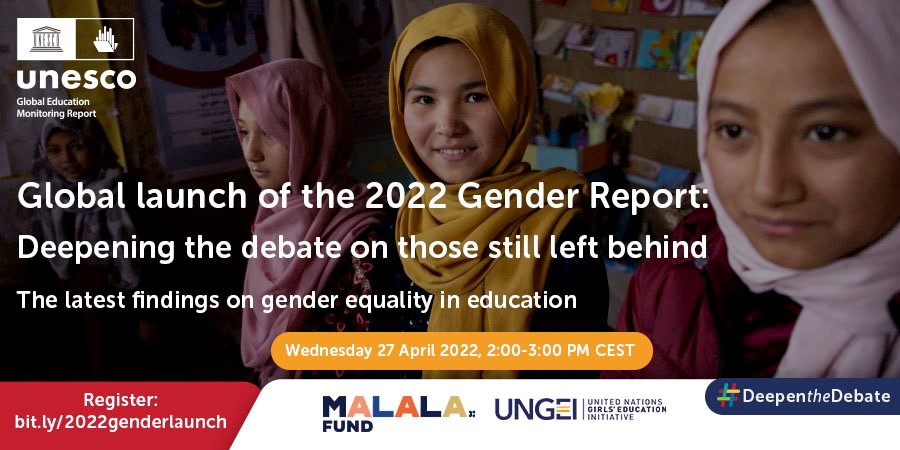
| April 2022 |
| The 2022 Gender Report calls for us to #DeepentheDebate on gender equality in education. Firstly it calls for us to pay closer attention to data. The Report has relied upon UIS data on gender gaps in out-of-school rates and a new comprehensive dataset on completion rates housed on its VIEW website. They show that gender disparities in education have changed rapidly. Globally, gender gaps in education access at all three levels of education are close to zero – but stagnation in some countries and pockets of exclusion within others prevail. Updated data housed on its WIDE website also present an almost global picture of the gender gap in learning outcomes. Girls now outperform boys in learning in general but are not among top performers in mathematics. Their advantage over boys in reading in early grades increases with age. They also outperform boys in science in secondary school in middle- and high-income countries. This analysis provides a baseline against which to compare the next layer of learning data that will be released in the coming 18 months and which will help assess the impact of the COVID-19 pandemic on inequality. The Report calls for the debate to also look beyond access, completion and learning to societal norms influencing progress. Gender equality in education is influenced by gender-based expectations, by politicians as well as parents, communities as well as businesses and faith leaders. Depending on the context, the role of these actors can push the gender equality agenda forward or undermine progress to maintain the status quo. Read the Report Share the social media pack Watch the event (2-3 PM CEST) Watch the video This spring, we have been running an awareness campaign of the new findings in the latest 2021/2 GEM Report on the progress being made towards SDG 4. The report included the latest analysis of the impact that the arrival of COVID-19 had on each target in the goal. While the real impact of #COVID-19 won’t be known for a while, the ramifications of the pandemic are explored in terms of learning losses, data collection, teacher well-being and support, inclusion, digital skills and student mobility. Take a look at the monitoring section of our Report and share our social media pack |
| 30% of families have to borrow to afford their children’s education in Uganda What are the implications of school choice in the United States of America? |
| Events coming up: 19 May: Launch of new GEM Report policy paper on non-state actors and higher education during the World Congress on Higher Education 2022 24 May: Global launch of the 2022 Youth GEM Report in partnership with the Global Students Forum 27 May: Ugandan national launch of the 2021/2 GEM Report organized by the Commonwealth Peoples’ Association of Uganda 7 June: Regional launch of the 2021/2 GEM Report during the 2nd Asia-Pacific Regional Education Minister’s Conference 2023 GEM Report consultation events coming up: 2 May: convened by Education International 19 May: convened by the All Children Reading: A Grand Challenge for Development – ACR GCD 1 June: convened by Monash University, Australia 2 June: during the 2022 World Summit on the Information Society (WSIS) Forum 5 June: during the 2nd Asia-Pacific Regional Education Minister’s Conference in partnership with SEAMEO 23 June: with the International Task Force on Teachers for Education 2030 Events just passed you can watch again: 22 March: Launch of the 2021/2 GEM Report in Brazil There have been 16 consultations held so far on the 2023 GEM Report with 12 organisations, 9 Ministers of Education and 540 officials from Ministries of Education. For additional information on GEM Report events visit our events calendar / see our list of webinar recordings 11 language versions of the 2021/2 GEM Report summary now available: Eng, 汉语, Français, Русский язык, Euskera, العربية , Deutsch , हिन्दी , Português , 日本語, Español |
 Gemdev
Gemdev